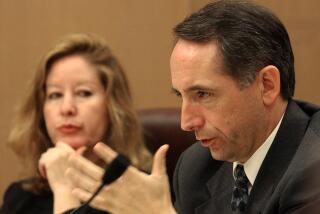A Slow Rebuilding for State Bar
Gov. Pete Wilson set out last year to punish leaders of the legal profession for what he saw as their wasteful spending and political lobbying. But when the State Bar of California had to shut its doors over the summer, it was the public that got hurt.
With the virtual shutdown of the bar’s lawyer discipline system, once a model for other states, consumers have had no place to turn if their lawyers proved incompetent or dishonest. Last week the California Supreme Court wisely stepped in to pick up the pieces.
The crisis began last October when Wilson vetoed the bar’s annual dues bill, insisting on changes in the bar’s system of governance and the scope of its activities. Wilson’s opposition helped to kill a series of bills to restructure the agency, and the bar--out of funds--had to lay off 90% of its employees.
This high-stakes game of chicken has produced no winners. About 7,000 complaints against lawyers are stacked up in the bar’s dark offices, a situation the high court has correctly characterized as “an unprecedented emergency threatening the protection of the public, the integrity of the legal profession and the interests of the courts.”
Now, acting on a petition from the bar, the court has authorized dues of $173 from each of the state’s 130,000 practicing lawyers. They will be used to revive the discipline system on an interim basis. Because the bar has automatic authority to levy a $77 license fee, each lawyer must pay a total of $250 by Feb. 1. Last year, attorneys paid dues of $458.
The court-ordered funds will allow the bar to hire and train new investigators, prosecutors and judges, reestablish its attorney ethics hotline and provide arbitration in fee disputes. But restoration is likely to be slow, and complaints now pending may take more than a year to resolve. It’s much easier to destroy than to rebuild.
The court’s order does not revive the bar’s long-standing legal aid programs for poor or low-income clients, its dispute resolution services or consumer education programs. Action on those items awaits a permanent legislative solution. When Gov.-elect Gray Davis and the new Legislature take over next month, they should follow the Supreme Court’s lead and put the public first.
More to Read
Get the L.A. Times Politics newsletter
Deeply reported insights into legislation, politics and policy from Sacramento, Washington and beyond. In your inbox three times per week.
You may occasionally receive promotional content from the Los Angeles Times.










